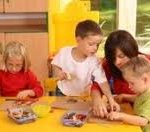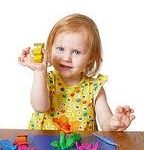At around the age of 2 1/2, your children is accepted by most preschools, but that does not mean your child is absolutely ready for preschool at that age. Readiness for preschool has more to do at the point of your child development. Whereas you are wondering whether your child is social enough, he is able to work independently or not, etc., here are some tips to prepare your child for preschools at first.
Encourage more social activities
Plan for every child can get along with other kids and make a team together. This means help your children realize the role of team work, taking turns games, sharing, etc. The suggestions are arranging playdates with one or two peers or enrolling him in a music or tumbling class.
Give him a imaginable interesting expectation
Children are often a little or much anxious about starting preschool. Keep saying things like “It’ll be the most fun you’ve ever had,” or “There’s nothing to be afraid of,” and try best to get your child’s mind rid of fears or concerns. Tell him about what to expect when he gets to school — classroom, mates, games and subjects. Before school begins, visit the classroom together at least once, preferably when other children and his future teacher(s) are there.
Come up with a good-bye ritual
Normally, your children may worry that you’re not coming back, or that you’ll get lost and won’t be able to find your way back to the school to pick him up at the end of the day, if this is the first time he is away from you. Invent a unique parting ritual — such as a high-five, or saying something like, “I’ll be back to get you soon, long before we see the moon” — that you do each time you leave him off. During the first few days, allow extra time to get him ready and out the door in the morning, too. The more calm things are at home, the easier the separation will be.
Do not be tempted to sneak out without so much as a wave when you drop him off. He will only be more distressed when knowing you’re gone. Instead, make a point of saying good-bye. Don’t drag it out or let on that you might be upset, too. Just do it matter-of-factly and confidently and he’ll learn to do the same.
Read to your child every day
Spending at least 15 minutes a day for reading time before your children begins school. This way will help your children become familiar with books first.
They also need to be teach the listening skills which is practice the best by some story rhythm. Stories with rhythm are particularly engaging, so look for books that repeat phrases. When he starts remembering the phrases, ask him to “read” with you. For instance, if you read The Three Little Pigs, after the wolf says, “Little pig, let me come in,” let your child fill in the next line, “Not by the hair on my chinny-chin-chin.”
Your child will also eager to predict the ending of a story in preschool. To help him prepare for this, you can stop midway through a reading and question him about what he thinks will happen next, or how he thinks the story will end.
Practice listening skills
Sometimes the children are too much active, and they are often difficult to sit still and listen. We should practice for them by occasionally asking him to sit quietly and close his eyes. Then ask him to tell you all the different sounds he hears. Talk about what’s making the sounds and where the sounds are coming from.
In preschool, Simon Says is another good listening-and-direction-following game in which children also learn to listen and follow directions that involve more than one step.
Educate the artist at home
Before the children can write, they can be practice to to develop the visual and fine motor skills . For examples, let them try with finger-painting or molding clay.
Keep paper, paints, crayons, and other art supplies on hand and encourage your child to create whenever he wants. Doing simple mazes and connect-the-dot pictures will also help your child develop beginning writing skills.


